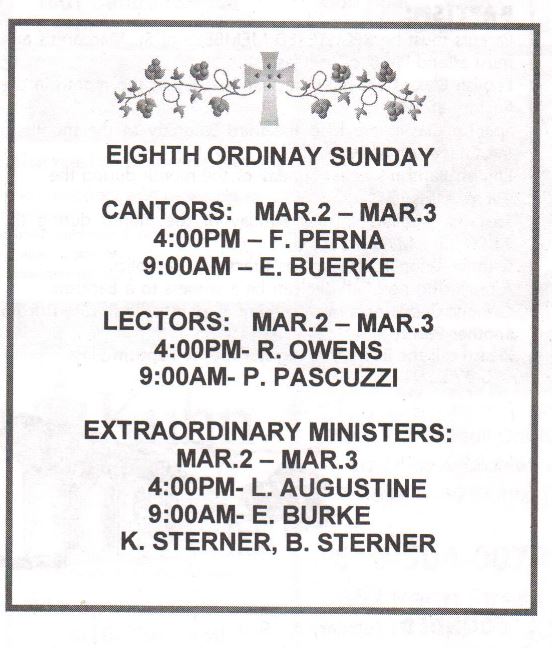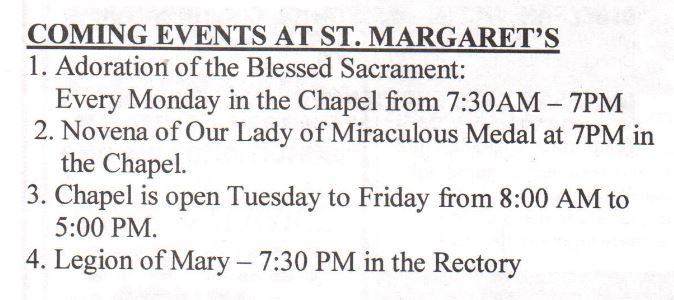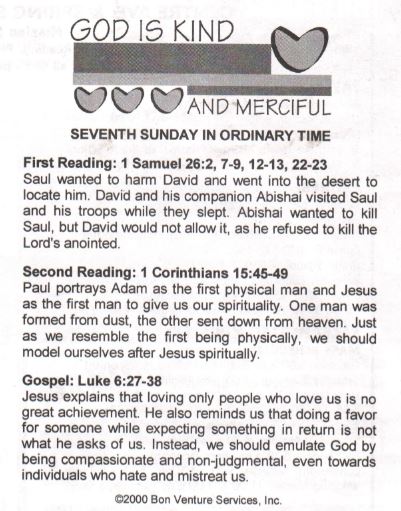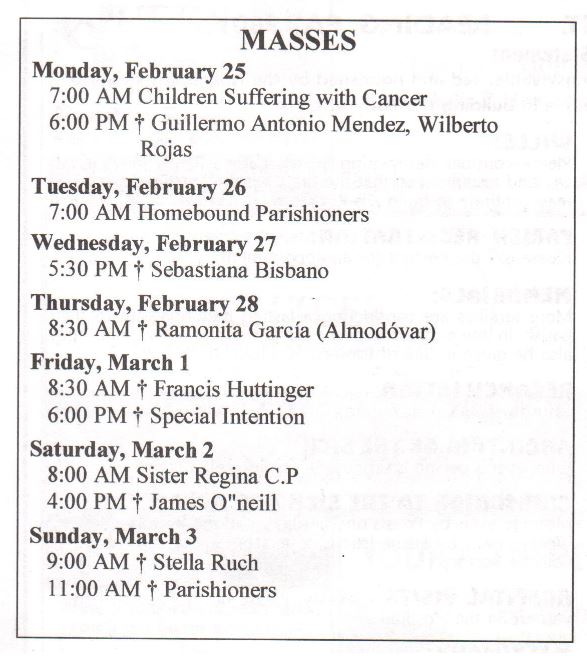
Cantors,Lectors and Extraordinary Ministers for 2-3 March 2019

Meditation: Luke 6:27-38

7th Sunday in Ordinary Time
Stop condemning and you will not be condemned. (Luke 6:37)
Jesus couldn’t have been more clear. If you want to avoid condemnation, don’t condemn other people.
Let’s say you see a rumpled, grizzled person sleeping on a park bench. You wonder how he got there. You wonder why he isn’t trying to fix his life. You begin to wish he weren’t there. You feel a kind of aversion to him, and you take a wide berth around him as you walk by. Jesus says, “Don’t condemn him.”
Or you are listening to the news when a story about a politician you don’t like comes on. You feel your shoulders tighten, and you think of all the ways this person is corrupt and misguided. You recall the evil policies he or she has supported, and you feel disgust for this person. Jesus says, “Don’t condemn.”
Or you learn of a teenager who is pregnant out of wedlock. You begin to think of how her parents must have failed in their job. Unkind labels for this young woman pop into your head, and you think of how you would never let yourself fall into such a horrible sin. Jesus says, “Don’t condemn her.”
To the best of your ability, put aside harsh judgments and condemning thoughts. If not for the other person’s sake, then for your own sake. Try to rise above the realm of judgment, where everyone gets what’s coming to them—because everyone in that realm will be judged harshly. Even you.
Instead, step into the realm of God’s mercy. Move into the realm where everyone is invited to forgiveness and treated with love, dignity, and generosity. Even you. Give the gift of forgiveness, and it will be given to you. Give the gift of a second chance—or a third or fourth or hundredth—and it will be given to you. Give the gift of the benefit of the doubt, and it will be given to you.
Even if you don’t want to give, do it anyway. Jesus commands it, and he promises eternal rewards to those who do.
“Lord, help me to be merciful as you are merciful.”
Pray, and Do Not Grow Weary Lessons in How Persistence Paves the Way

There once was a woman who prayed constantly for her husband and three children. She was the only believer in her family, and she desperately wanted everyone else to embrace the faith. One child in particular gave her more heartache than all the rest. He was very smart, and he knew it
Over time, the woman found a new spiritual advisor who encouraged her to keep on praying. “Surely the son of so many tears will not perish,” he told her. He then initiated a friendship with the woman’s son. Unlike others who had tried to win him over, this man could compete with him intellectually. Eventually, because of the spiritual advisor’s example and his arguments, the young man accepted the Lord and converted to Catholicism.
Now, we could say that the wisdom and witness of the spiritual advisor are what finally made the difference, but we should never forget the prayers of his mother. Her persistence finally paid off!
In case you haven’t figured it out yet, the persistent mother was St. Monica, the spiritual advisor was St. Ambrose, and the son was the great St. Augustine.
Persistence Pays Off. Monica’s story tells us that intercessory prayer doesn’t depend entirely on the level of our holiness—it depends on our humility and persistence as well. So let’s look at two of Jesus’ parables: the parable of the persistent friend and the parable of the persistent widow to see what we can learn about being steadfast in prayer (Luke 11:5-8; 18:1-8).
In the parable of the persistent friend, Jesus describes a man knocking on his neighbor’s door late at night to ask for some bread. The man keeps pounding, despite his neighbor’s protests. Eventually, the neighbor gets up and gives him what he wants—if not for friendship’s sake, then in the hopes of getting back to sleep.
Jesus tells a similar story in the parable of the persistent widow. This time, it is a poor widow who is relentless in demanding justice from a corrupt judge. It’s not hard to imagine this judge dreading the woman’s arrival every morning. He knows what she’s going to say, and he knows how he will respond. Eventually, he gives in, thinking, “I’ve got to get this woman off my back before she drives me crazy!”
Pound on the Door. We should be clear. Jesus is not saying that our heavenly Father is corrupt or that he is an inhospitable neighbor. The focus of these parables is on the ones making the requests. That’s clear when Jesus follows the parable of the persistent neighbor with his famous “ask, seek, knock” saying. It’s also clear when he ends the parable of the persistent widow by asking, “Will not God then secure the rights of his chosen ones who call out to him day and night?” (Luke 18:7). In both parables, Jesus is telling us, “Be persistent! Feel free to wear your Father out with your petitions. Go ahead, and nag him if you have to.”
These parables emphasize that our heavenly Father is loving, kind, and merciful. He has the power to help us, and he will help us. Our God does not sleep. He is never disturbed when we approach him. He welcomes our prayers. He willingly and abundantly gives us what we need. He is a good God!
At the same time, these parables emphasize the intensity that God wants from us as we come to him with our needs. He wants us to ask, seek, and knock. He wants us to keep pounding on the door. He does this not because he is teasing us or playing hard to get. He does it because he knows that the more persistently we pray for someone, the more deeply that person’s needs and concerns settle in our hearts. He knows that if we just say a quick prayer and then move on, we have not given the Holy Spirit the opportunity to soften our hearts or make us more compassionate.
Persistence: Tied to the Second Coming. Did you notice that Luke placed these two parables about persistent prayer right after two of Jesus’ most important teachings? The parable of the persistent widow comes directly after Jesus’ description of what life will look like just before his return at the end of time (Luke 17:20-37). He spoke of how sudden his return will be, “as lightning flashes and lights up the sky from one side to the other” (17:24). He also explained that some people will enter the kingdom of God, and others may be left behind. Then, as he summarized the parable, Jesus asked, “When the Son of Man comes, will he find faith on earth?” (18:8). So it seems that Jesus linked his teaching about persevering in prayer to his warnings about the final judgment.
Why would Jesus make such a connection? One possible answer is that he knows how powerful intercessory prayer can be. Just as St. Monica never stopped praying until her son embraced Christianity, we, too, should pray and not give up until all of our friends, families, and neighbors come to faith. Jesus was clear that the Second Coming will happen. He was clear that some will be saved, and others may not be. And because of that, he was clear that we should persevere in intercession so that as many people as possible will turn to him and enter his kingdom.
It can be easy to think that our prayers are little more than wishful thinking and vague hoping, but this is far from the truth. Our acts of intercession—especially our persistent, faith-filled, and ambitious prayers—can move mountains. They can have eternal consequences. They can pave the way for people who are far from the Lord to find salvation. Imagine what it will be like in heaven, when you see the people you prayed for! Imagine the joy you will feel in knowing how many people you have helped—and imagine the gratitude and love they will have for you!
Persistence: Tied to the Lord’s Prayer. The parable of the persistent friend comes immediately after Jesus teaches his disciples the Lord’s Prayer (Luke 11:1-4). Again, this is an important point. The Lord’s Prayer describes a disposition, a way of life. It shows how every aspect of our lives—our spiritual well-being, our daily bread, our relationships, and our battle against temptation—is based on our dependence on God. We need him if we want to enter his kingdom; we need him to provide us with all that we need each day, both materially and spiritually; we need him to help us treat each other with love and mercy; and we need him to strengthen us against sin’s destructive forces. In short, we need him to treat us as a perfect father would treat his children.
But what does this have to do with intercessory prayer—especially since the Lord’s Prayer is all about what we are asking God to do for us? Perhaps part of the answer lies in the parable. In the story, the persistent neighbor is asking for bread, which is what Jesus taught us to ask our Father to give us every day. He is asking his neighbor for help, not for himself, but for a visitor who has shown up unexpectedly.
This is the nature of intercessory prayer: asking, seeking, and knocking, on behalf of the people we know who are living without their “daily bread” in some form or other. By teaching us the Lord’s Prayer and following it immediately with a story about a persistent neighbor, Jesus is telling us to go to God for our needs and for the needs of other people—and to go often. He is telling us that, in addition to praying for people, we should also ask our Father to give us more than our daily bread; we should ask for extra bread that we can give away.
A Persistent Church. Both of these parables, the persistent widow and the persistent friend, tell us to “pray always without becoming weary” (Luke 18:1). They tell us to pray for our friends, our families, our neighbors, our enemies, and even people we haven’t met yet. They tell us to look heavenward by praying that everyone will be ready for Jesus’ Second Coming and to keep our eyes here on the earth by praying that everyone receive the daily grace that they need to live in peace. And they tell us never to give up in our prayers.
So keep on praying! Persist, no matter how bleak things appear. Remember how Moses pleaded with God and changed his mind (Exodus 32:7-14). Remember how the Syrophoenician woman’s persistence impressed Jesus and helped him change his mind (Mark 7:24-30). Remember St. Monica. These heroes of the faith show us that all it takes sometimes is a willing heart, an ounce of faith, and a lot of persistence.







